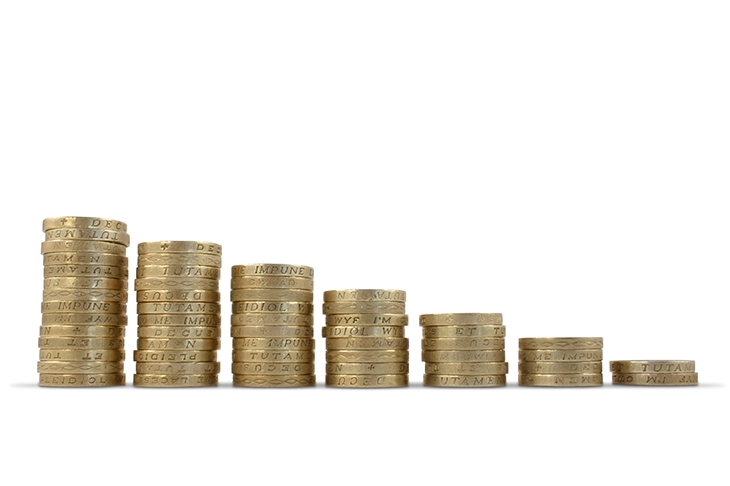A wave to the FT team whose weekend feature on how the pound has been hit by fears of no deal began with this arresting sentence: ‘Sterling has finally buckled.’ I almost spilled my café crème as I read that in a sunlit French square and contemplated JP Morgan’s ‘conservative’ forecast of a $1.15 no-deal exchange rate, with a possible further 10 per cent fall beyond that, to compare with $1.50 before the referendum and ‘purchasing power parity’ (per UBS) of $1.57. As for the euro, more in a moment — but we’re already only a whisker from pound-euro parity.
Should we be upset by this decline of a national symbol whose name, sterling, also means ‘excellent or valuable’? Or should we accept a slide to lows rarely seen since the 1970s as a price worth paying to extract ourselves from Europe’s grip? There is, after all, an argument (advocated by the free–thinking tycoon John Mills, for one) that a radically devalued pound is the key to future prosperity, because it will ‘unleash’ export manufacturers and wipe out our longstanding trade deficit; it might bring inflation too, as import prices soar, but the Bank of England has the tools to deal with that.
Or does it? Suppose the Bank feels the need, in response to a no-deal shock, to cut rates and even resort to quantitative easing (both inflationary) rather than raising rates to quell inflation? Suppose exporters are so impeded by customs chaos that they can’t sell more stuff abroad at any price? Suppose all we get are waves of speculators thrashing sterling and an invasion of bargain-hunting US investors — as seems to have begun with Advent’s bid for the Cobham aerospace group?
Downing Street will no doubt tell us a cheap-as-chips pound offers extra ‘turboboost’ alongside Boris’s spending bonanza. In truth it’s another unquantifiable risk in a strategy of breathtakingly high-risk brinkmanship. Yes, it’s possible we’ll come out the other side richer, happier and more admired in the world, but would you bet big on it? I’m praying for a deal and a sterling bounce.
HSBC firebreather
Chief executives are rarely fired in the holiday season, so it must have been quite a surprise for HSBC’s John Flint to find the binbag and P45 on his desk after only 18 months in post and despite a 16 per cent rise in half-year pre-tax profits to $12.4 billion. At a time of increasing tensions afflicting Asian markets and HSBC’s share price, Flint wasn’t forcing the pace sufficiently to please Mark Tucker, the former Wolverhampton Wanderers player and Pru insurance chief who was hired as HSBC chairman in 2017. An ex-colleague described Tucker to me at that time as ‘intense, hard-driving, slightly oddball’ — the sort of hands-on executive who does not easily transition to chairmanship. Having breathed fire on the 20-year HSBC veteran Flint, I doubt Tucker will stick to the bank’s tradition and appoint another insider to follow him; indeed he may regret not acting a month earlier, when he might have bagged rugged Ross McEwan, the Kiwi who’s leaving RBS and heading south to take on the challenge of National Australia Bank.
Non au Franglais…
In France for August, I’m struck as ever by the anti-Anglo-Saxon tone of public discourse: even the village priest’s sermon begins with a parable of the dangers of globalisation. While the prospect of the UK’s ‘sortie brutale’ is consigned with a Gallic shrug to an inner page of Le Figaro, its headline stories are about the unwelcome advance of ‘le franglais’— the incursion of ‘selfie’, ‘stand-up’ and other Anglo–Americanisms despite a 1994 law that banned such horrors from official publications — and a proposed fiscal attack on ‘Gafa’.
That’s an acronym for Google, Apple, Facebook and Amazon, whose revenues in France are shortly to be subjected to a 3 per cent levy. Amazon retorts that it will simply pass the charge to consumers and sellers — thereby disadvantaging small French companies — while Donald Trump has threatened a retaliatory import tariff on French wine. Meanwhile, back in Blighty, the first indication of what a Trump–Johnson ‘special relationship’ might really look like took the form of messages from the White House that we can kiss goodbye to a US-UK trade deal unless our new government scraps Philip Hammond’s ‘digital services tax’, due in force next April.
If the French insist on their digital tax while Downing Street chickens out of ours, we may inadvertently gain some minor commercial advantage. But really what these parallel developments signify is the shameful failure of western governments to agree on a co-ordinated way of diminishing the colossal advantage that has accrued to supranational tax avoiders over law-abiding local competitors.
…et non au Big Mac
The handy ‘Big Mac Index Converter’ says a pound in France should be worth €1.32 in terms of burger purchasing power. But we’re down to €1.09, and I hear of airport bureaux de change offering as little as €0.91. That won’t impede the weekly restaurant tips that are this column’s summer tradition, but it may stop me venturing into Michelin rosette territory. Don’t despair, however: I’m not going to start eating or writing about Big Macs. Instead let me direct you to Diabolo Fraise at Nabirat (Dordogne), a middle-of-nowhere fixed-menu eaterie owned by its village commune, functioning partly as a canteen for a nearby engineering works and packed every day despite this year’s startl-ingly low tourist numbers.
Four delicious courses, robust wine and coffee, all for €14. Even if that’s 15 and a half of your Heathrow pounds, it’s unbeatable value — and in the sort of ambience that sometimes makes me wish I’d been born a Frenchman. As I struggle to explain what’s going on in Westminster to neighbours here of several nationalities, it’s becoming seriously embarrassing to be an Englishman.







Comments